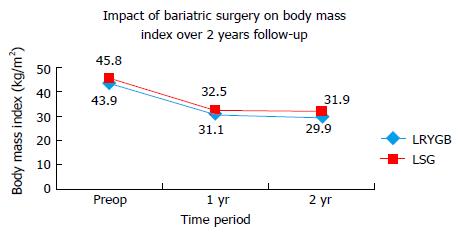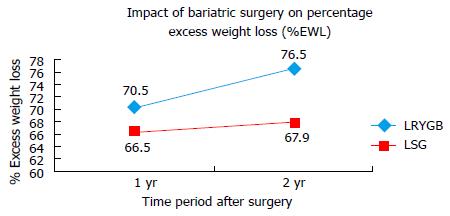Copyright
©The Author(s) 2017.
World J Gastrointest Endosc. Apr 16, 2017; 9(4): 162-170
Published online Apr 16, 2017. doi: 10.4253/wjge.v9.i4.162
Published online Apr 16, 2017. doi: 10.4253/wjge.v9.i4.162
Figure 1 Impact of bariatric surgery on body mass index over two years follow-up: There was no significant difference in body mass index preoperatively (P = 0.
11) and at 1 year post-op (P = 0.175). At 2 years follow-up however, patients who had undergone LSG had significantly higher BMI (P = 0.038) compared with those who had undergone LRYGB. Mean BMI were compared using Student’s t test. LSG: Laparoscopic sleeve gastrectomy; LRYGB: Laparoscopic Roux-en-Y gastric bypass; BMI: Body mass index.
Figure 2 Impact of bariatric surgery on percentage excess weight loss over two years follow-up: There was no significant difference in percentage excess weight loss at 1 year post-op (P = 0.
36). At 2 years follow-up however, patients who had undergone LRYGB had significantly greater excess weight loss (P = 0.044) compared with those who had undergone LSG. %EWL were compared using Student’s t test. LSG: Laparoscopic sleeve gastrectomy; LRYGB: Laparoscopic Roux-en-Y gastric bypass; %EWL: Percentage excess weight loss.
- Citation: Garg H, Priyadarshini P, Aggarwal S, Agarwal S, Chaudhary R. Comparative study of outcomes following laparoscopic Roux-en-Y gastric bypass and sleeve gastrectomy in morbidly obese patients: A case control study. World J Gastrointest Endosc 2017; 9(4): 162-170
- URL: https://www.wjgnet.com/1948-5190/full/v9/i4/162.htm
- DOI: https://dx.doi.org/10.4253/wjge.v9.i4.162










